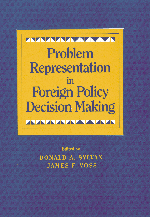Book contents
- Frontmatter
- Contents
- List of Contributors
- Part I Introducing Problem Representation
- Part II Overarching Conceptual Issues
- 3 The Interpretation of Foreign Policy Events: A Cognitive Process Theory
- 4 Problem Identification in Sequential Policy Decision Making: The Re-representation of Problems
- 5 Collective Interpretations: How Problem Representations Aggregate in Foreign Policy Groups
- 6 Image Change and Problem Representation after the Cold War
- Part III Empirical Analysis
- Part IV Conclusion
- Index
3 - The Interpretation of Foreign Policy Events: A Cognitive Process Theory
from Part II - Overarching Conceptual Issues
Published online by Cambridge University Press: 12 October 2018
- Frontmatter
- Contents
- List of Contributors
- Part I Introducing Problem Representation
- Part II Overarching Conceptual Issues
- 3 The Interpretation of Foreign Policy Events: A Cognitive Process Theory
- 4 Problem Identification in Sequential Policy Decision Making: The Re-representation of Problems
- 5 Collective Interpretations: How Problem Representations Aggregate in Foreign Policy Groups
- 6 Image Change and Problem Representation after the Cold War
- Part III Empirical Analysis
- Part IV Conclusion
- Index
Summary
Foreign policy scholars have long recognized the importance of the initial stages of decision making - the perception and interpretation of information (e.g., Boulding 1956; Holsti 1962, 1967; Snyder, Bruck, and Sapin 1962; Kelman 1965; Jervis 1970, 1976; Anderson 1981; Lebow 1981; Bennett 1981, 1982; Tetlock 1983; Rosati 1984, 1995; Cottam 1986; Powell, Dyson, and Purkitt 1987; Vertzberger 1990; Banerjee 1991; Ensign and Phillips 1991; Khong 1992; Shimko 1995). Much of this work focuses on distortions and errors in the process, arguing that the imperfect images decision makers rely on to interpret the world are a frequent source of misperceptions and poor decisions. Yaacov Vertzberger, for example, develops this theme in his recent book on the information-processing approach to foreign policy analysis, arguing that “accumulated misjudgments, misevaluations, wrong inferences, and simple unawareness of relevant data are likely to carry over to the next stages [of decision making], with negative ramifications for the quality of the overall coping process” (1990: 8). In short, the initial problem representation strongly constrains subsequent behavior.
One may view the information interpretation process at either the organizational or the individual level, although more work in the area of foreign policy decision making has focused on the impact of images or belief systems on the problem representations of individual elites. This work, in my view, remains somewhat dissatisfying, in part because it does not usually consider organizational patterns in the flow of information or institutional memory and rules (but see Beasley, this volume; Vertzberger 1990; Haney 1995). A second problem for scholars in this area has been the insufficiency of the modeling languages available for expressing theories of foreign policy decision making. Computational modeling offers one important set of methods for representing and exploring the descriptively rich theoretical ideas that have developed in this area (Taber 1992; Taber and Timpone 1994, 1996a, 1996b; Duffy and Tucker 1995; Schrodt, in press), just as experimental methods allow us to test these ideas empirically (Geva, DeRouen, and Mintz 1993; Sylvan, Ostrom, and Gannon 1994).
This chapter focuses on one component of a distributed informationprocessing theory of event interpretation. After briefly sketching the broad outlines of an organizational process theory, I tum to a more detailed discussion of the cognitive level - how individual decision makers within the larger organizational structure interpret the information they receive as inputs.
Information
- Type
- Chapter
- Information
- Problem Representation in Foreign Policy Decision-Making , pp. 29 - 52Publisher: Cambridge University PressPrint publication year: 1998
Accessibility standard: Unknown
Why this information is here
This section outlines the accessibility features of this content - including support for screen readers, full keyboard navigation and high-contrast display options. This may not be relevant for you.Accessibility Information
- 8
- Cited by
